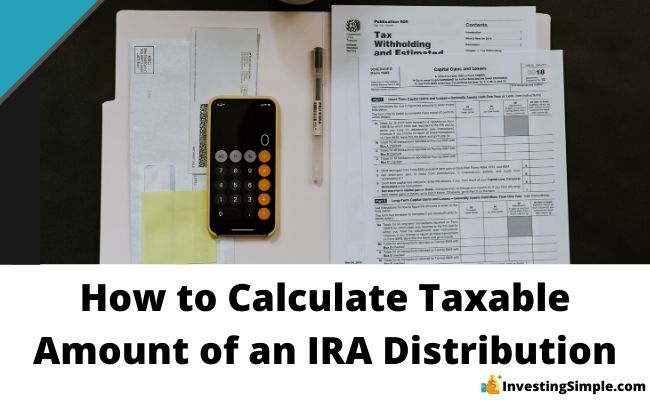





Some of the most well-known investment vehicles, known as IRAs, offer an opportunity to save for retirement in a tax-advantaged way.
Whether it is tax-deferred or tax-free, these vehicles can help you secure a wealthy retirement.
While both a Traditional and Roth IRA offer great tax advantages for those focused on growth, users need to be aware of taxes and early withdrawal penalties that exist.
The tax rate on any taxable IRA distribution is your ordinary income tax rate.
Even though the investments inside of your IRA may have recorded gains, there are no preferential tax rates for these capital gains. This is different from capital gains that are earned in taxable investment accounts.
Understanding how your retirement accounts will be taxed is an important piece in your goal for financial independence.
Let’s look at how to calculate the taxable amount on an IRA distribution.
Robinhood is a popular "all-in-one" investing app.
While they are most well-known for their commission free stock trading, they've recently shaken up the Retirement Investing World too.
Introducing Robinhood Retirement; home of the biggest IRA match on the market.
Here's what you need to know:
And don't worry, this comes with a Portfolio Builder Tool. You don't have to construct your investment portfolio from scratch if you don't want to.
Lastly, you'll even get a free stock worth up to $200 when you open a new Robinhood account using our link.
Contributions to a Traditional IRA can be made on a pre-tax basis. This is true in most cases.
However, if your income exceeds a certain level, you will not be able to benefit from contributions to your Traditional IRA.
For the year 2024, the full deductibility amounts have changed from years past. Users will have full deductibility benefits if their MAGI is $123,000 or less (joint) and $77,000 or less (single); partial deductibility benefits are available up to $143,000 (joint) and $87,000 (single).
If you do not fall within the numbers listed above, you can still contribute to a Traditional IRA and receive benefits from growth, but you will not have the same tax benefits of deducting your contributions.
Withdrawals from a Traditional IRA account are always subject to ordinary income taxes except for any amount contributed on an after-tax basis. It is the job of the account holder to keep track of after-tax contributions for this purpose.
Earnings on the funds invested within the account, whether the contributions were made on a pre-tax or an after-tax basis, are always taxable when distributed from the account.
If you are hoping to withdraw funds before you reach the age of 59 ½, distributions may be subject to a 10% penalty. This is in addition to any taxes due.
There are some exceptions to this 10% penalty outlined below.
Most of these exceptions have specific rules and conditions attached to them, you should consider consulting a tax professional if one or more of these situations apply to you.
To see the full list, visit the IRS website.
Roth IRAs gain most of their popularity because they are not taxed upon distribution if certain conditions are met.
Contributions to a Roth IRA are made on an after-tax basis, which means you are unable to deduct your distributions from your income. There is an exception to this which you can view here.
While this may provide no benefit in the short term, investors are then able to grow their money on a tax-free basis.
Qualified distributions will not be subject to income taxes if the following conditions are met:
In addition, distributions made to those under 59 ½ who have satisfied the five-year requirement will not be subject to ordinary income tax if funds are used:
Distributions from a Roth IRA may be subject to income taxes and in some cases the 10% penalty.
Here are a few common scenarios to consider:
Converting a Traditional IRA to a Roth IRA can be a solid financial move in some cases, depending upon your situation.
While this is not a distribution in the sense of receiving cash from the IRA account, by doing a Roth conversion you are taking the funds from the Traditional IRA account and converting those funds to a Roth IRA account.
These funds will then not be taxed when withdrawn in retirement assuming the appropriate conditions are met.
Funds converted to a Roth IRA from a Traditional IRA will be subject to income taxes, with the exception of money contributed on an after-tax basis.
Where there is after-tax money involved, the money converted will be taxed on a prorated basis of the after-tax portion as a percentage of all Traditional IRA funds across all Traditional IRA accounts held.
It is also important to note the 60 day requirement when conducting a rollover. If the distribution is paid directly to you, then you have 60 days to contribute the funds to the new IRA or retirement plan.
Failure to do so will result in a tax liability.
Your financial advisor can assist you with rolling over an old 401(k) from a previous employer or a Traditional IRA. They can also assist with a Traditional IRA to Roth IRA conversion.
You can also work with a brokerage firm that offers retirement accounts.
![]()
Robinhood, for example, offers both Traditional and Roth IRA accounts. In addition, you will get a 1% match on the value of the account that you rollover to Robinhood.
For example, if you transferred an account worth $1,000,000 - you would get a $10,000 bonus.
Don't forget to grab your free stock worth up to $200 from Robinhood today!
The discussion above only covers federal income taxes.
Most states also tax IRA distributions from Traditional accounts in some fashion, but not all do. It’s best to check on the rules for your state prior to taking a distribution.
If you have questions about IRA distributions, it may be helpful to discuss your plans with a CPA or certified financial planner.